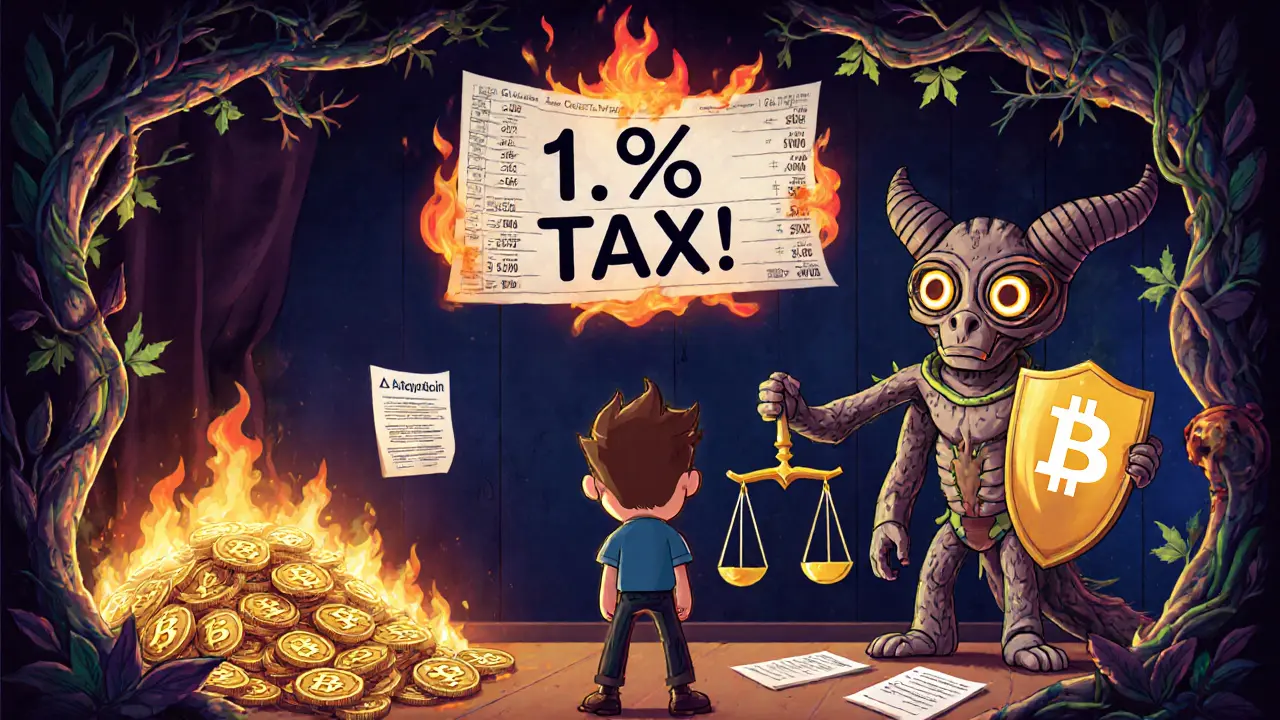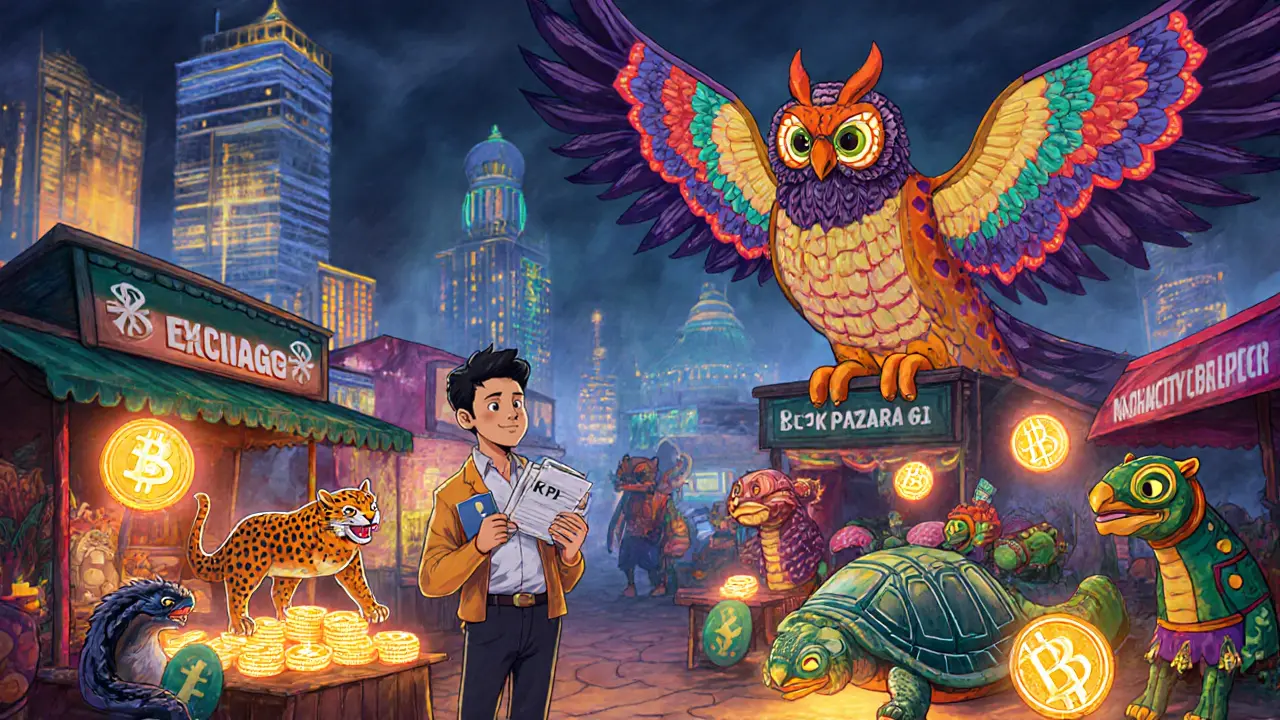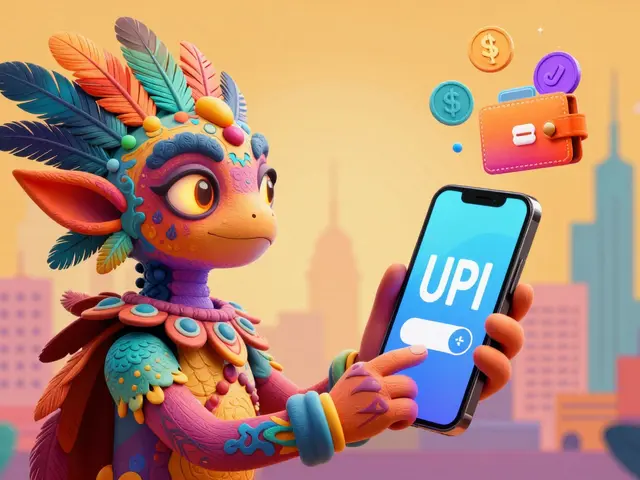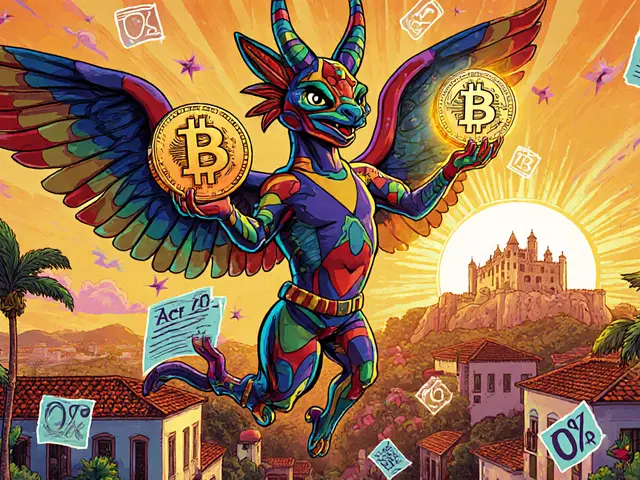Indonesia Crypto Tax Calculator
Tax Calculator Results
Enter your trading volume and exchange type to see your tax calculation
Indonesia doesn’t ban cryptocurrency - it just makes you play by strict rules. If you’re trading crypto here in 2025, you’re not breaking the law. But if you skip the steps, you’re risking fines, account freezes, or worse. The system changed dramatically in 2025, and most traders still don’t fully understand it.
It’s Not About Buying Crypto - It’s About Where You Buy It
You can legally buy Bitcoin, Ethereum, or any other digital asset in Indonesia - but only through exchanges licensed by the Financial Services Authority (OJK). As of June 2025, there are exactly 22 approved platforms. That includes giants like Indodax, Tokocrypto, and Pintu. If you’re using Binance, KuCoin, or any foreign site, you’re technically breaking the law - not because you own crypto, but because you’re trading outside the regulated system. The OJK took over from BAPPEBTI on January 10, 2025. That wasn’t just a name change. It meant stricter rules: every exchange now needs at least IDR 5 billion ($325,000) in capital, ISO 27001 cybersecurity certification, and real-time monitoring of transactions over IDR 500 million ($32,500). If they miss a red flag, their license gets pulled overnight.The Tax System Changed - And It’s Now Simpler (But More Punitive)
Before August 1, 2025, crypto trades were taxed at 0.1% if done on a licensed exchange. Now, it’s 0.21% - but only if you trade on one. If you use a foreign platform, the tax jumps to 1%. That’s not a suggestion. It’s a legal requirement. The key change? Value Added Tax (VAT) is gone. Crypto is no longer treated like a commodity. It’s now classified as a digital financial asset - similar to stocks. That’s why VAT doesn’t apply. But the final income tax is now fixed and mandatory. Exchanges automatically withhold the tax. You don’t file it yourself - unless you’re trading on a foreign site. Then you’re on the hook to report and pay 1% manually. A lot of people got burned in the first month. Some thought the 1% rate was optional. Others didn’t realize their Binance trades counted. One trader in Jakarta lost $2,850 in BTC because he didn’t report his foreign exchange activity. The tax agency doesn’t care if you didn’t know. They track it through bank transfers and blockchain data.How to Get Started - The 4-Step Process
If you want to trade legally, here’s what you actually need to do:- Choose an OJK-licensed exchange. Check the official list on ojk.go.id. Don’t guess. Only 22 are approved.
- Submit your documents. You need your KTP (national ID), NPWP (tax ID), and a selfie holding your ID. No exceptions.
- Pass the financial literacy test. It’s 15 multiple-choice questions. You need 80% to pass. Topics include volatility, scams, and wallet security. Most people fail the first time. Study the OJK’s free guide on their crypto portal.
- Link your bank account. Only Bank Indonesia-approved banks work. You can’t use e-wallets like GoPay or OVO for fiat deposits anymore.

Who’s Trading - And Why It’s Not Who You Think
There are 14.3 million active crypto users in Indonesia. That’s nearly 5% of the population. But the profile is narrow: 68% are between 18 and 35. 76% are male. More than half live in Java - Jakarta, Bandung, Surabaya. The biggest players? Indodax controls 47% of the market. Tokocrypto has 28%. Pintu has 15%. The rest fight over the leftover 9%. That’s not competition - it’s an oligopoly. The capital requirements killed smaller exchanges. Only the big ones can afford the compliance costs. Most users aren’t day traders. They’re holding Bitcoin as a hedge against inflation. The rupiah lost 4.2% against the dollar in 2024. Crypto isn’t a gamble for them - it’s a survival tool.The Hidden Trap: Foreign Exchanges and the 0.79% Tax Gap
Here’s the big problem: the 1% tax on foreign platforms is almost 5 times higher than the 0.21% on local ones. That gap is intentional - it’s designed to force traders onto domestic exchanges. But it’s backfiring. After PMK 50/2025 launched, domestic trading volume dropped 15.3% in 30 days. Why? High-volume traders - the ones moving millions - switched to foreign platforms. They’re willing to pay 1% because they can avoid OJK’s intrusive monitoring. They don’t want their transactions flagged. They don’t want to explain why they transferred IDR 2 billion in a week. The Indonesian Blockchain Association warned the government: this tax gap will hollow out the local market. And they’re right. If you’re trading more than IDR 100 million ($6,500) per month, you need special OJK approval just to move funds out of the country. That’s a nightmare for serious traders.What’s Coming Next - And How to Prepare
The OJK is already planning two big changes:- Proof-of-reserves audits starting January 1, 2026. Every exchange must prove they hold all the crypto they claim to. No more fake balances. No more “we lost your funds” excuses.
- Possible stablecoin payments for cross-border remittances. Bank Indonesia is talking about letting USDT or USDC be used for international transfers - but only if they’re issued by licensed partners. That could change everything.

Real Talk: Is It Worth It?
Yes - if you’re a casual trader. The 0.21% tax is fair. The rules are clear. You get protection. If your exchange gets hacked, you’re covered under OJK’s investor compensation scheme. No - if you’re a high-volume trader or want to use DeFi apps. Most DeFi protocols aren’t licensed. Using them is a legal gray zone. The OJK hasn’t said they’re illegal - but they haven’t said they’re legal either. That’s a risk. The system works for the majority. But it’s built to control, not empower. If you want to trade crypto legally in Indonesia, you have to accept the trade-off: convenience for compliance.What to Do If You’re Already Using a Foreign Exchange
If you’ve been trading on Binance, Kraken, or Bybit:- Stop using it for large trades. The tax authorities are tracking IP addresses and bank links.
- Switch to an OJK-licensed platform for any new deposits.
- If you’ve made profits on foreign platforms in 2025, file a self-report with the tax office by March 31, 2026. Use the form on djponline.pajak.go.id. Pay 1%.
- Don’t wait for a notice. The DGT has already flagged 12,000 accounts for non-compliance.
Where to Get Help
The OJK has a dedicated portal: portal.lkd.ojk.go.id. It’s in Bahasa Indonesia, but it’s the only official source. They also have a 24/7 hotline: +62 21 157 8900. Don’t expect quick answers - average wait time is 4.7 hours. But it’s the only way to get accurate info. If you’re confused about taxes, use PwC Indonesia’s free Crypto Tax Guide (2025 edition). It’s the clearest breakdown available.Can I use crypto to pay for goods in Indonesia?
No. Under Bank Indonesia’s Regulation No. 20/6/PBI/2018 and the 2023 Payment Systems Law, the rupiah is the only legal tender. Using Bitcoin, Ethereum, or any crypto to buy coffee, rent a room, or pay a freelancer is illegal - even if the seller agrees. You can trade crypto as an investment, but never as a payment method.
What happens if I don’t pay the 1% tax on foreign exchange trades?
You risk penalties of up to 100% of the unpaid tax, plus interest. The Directorate General of Taxes (DGT) tracks crypto transactions through bank records, IP logs, and blockchain analysis. In 2025, they began matching wallet addresses with taxpayer IDs. If you’re caught, you’ll get a formal notice - and your bank account could be frozen until you pay.
Are staking rewards taxed in Indonesia right now?
Not yet. As of November 2025, staking rewards are not taxed. But the Directorate General of Taxes has confirmed they’re preparing rules for 2026. If you’re earning more than IDR 10 million annually from staking, keep records. You’ll likely need to report it as income next year.
Can I withdraw crypto from an Indonesian exchange to my personal wallet?
Yes - but only if you’ve completed full KYC and passed the financial literacy test. Withdrawals are limited to one wallet address per user. You can’t change it without re-verifying. Exchanges also freeze withdrawals for 48 hours after large transfers (over IDR 100 million) for security checks.
Is it safe to use a licensed Indonesian crypto exchange?
Yes - more than ever. All licensed exchanges must now hold 100% of user funds in cold storage, undergo quarterly audits, and carry insurance against hacking. The OJK also requires them to participate in a compensation fund. If an exchange collapses, users can claim up to IDR 500 million in losses. That’s a level of protection you won’t find on Binance or Kraken.
Will Indonesia ban DeFi or NFTs in the future?
Not yet - but they’re watching closely. DeFi platforms and NFT marketplaces currently operate in a gray area. The OJK hasn’t licensed any of them. If they’re used for money laundering or evade tax reporting, they’ll be blocked. The government’s goal isn’t to ban innovation - it’s to bring everything under the same regulatory umbrella as banks.











13 Comments
So let me get this straight-Indonesia is basically forcing people to use state-approved crypto exchanges like it’s 1984 and Bitcoin is a political dissident? 🤡
I live in Mumbai, and honestly? This is the most balanced crypto regulation I’ve seen anywhere. The 0.21% tax is laughably low compared to India’s 30% + cess. And the fact they’re protecting users with insurance? Brilliant. I wish our government had this much foresight.
I just switched to Indodax last week after getting a tax notice for my Binance trades 😭 I didn’t even know they tracked IP addresses!! Now I’m doing the literacy test for the 3rd time… why is ‘what is a private key’ so hard?? 🙈
The structural shift from BAPPEBTI to OJK is a masterstroke in regulatory consolidation. The capital requirements, ISO 27001 mandates, and real-time monitoring thresholds are not merely bureaucratic hurdles-they are foundational safeguards against systemic counterparty risk. The 1% tax differential on foreign platforms is economically rational: it internalizes the externalities of regulatory arbitrage. What’s being misunderstood is that this isn’t about control-it’s about creating a resilient, auditable, and investor-protected financial infrastructure. The oligopoly is a natural consequence of economies of scale in compliance. Smaller players simply couldn’t absorb the cost of real-time blockchain analytics engines and cold-storage insurance. This isn’t bad regulation-it’s advanced financial statecraft.
I love how they made the financial literacy test mandatory! So many people think crypto is a get-rich-quick scheme. The fact that they’re forcing users to learn about volatility, scams, and wallet security? 👏 I wish the U.S. did this. Also, the 48-hour withdrawal freeze after large transfers? Smart. I’ve seen too many accounts get drained in 30 seconds. And yes, cold storage + insurance = way safer than Binance’s ‘we’ll try to fix it’ policy. 😅
The part about staking rewards not being taxed yet is huge. I’ve been earning 6% APY on my ETH staking and was bracing for a tax bomb. Glad to see they’re not rushing into it. But I’m keeping detailed records just in case. This is the kind of thoughtful, phased regulation that actually works.
As someone who’s lived in both Jakarta and Austin, I can say this: Indonesia’s crypto rules are more sane than America’s. Here, you know where you stand. In the U.S., the SEC is playing whack-a-mole with every DeFi protocol while Congress does nothing. At least in Indonesia, if you follow the steps, you’re legal. That clarity? Priceless.
bro i tried to use tokocrypto and their customer service took 7 hours to reply to my kyc issue 😭 and i had to upload my ktp 3 times. but still better than getting my bank frozen. also the tax is so low i just pay it and forget it. no stress.
So let me get this straight-Indonesia is now the ‘crypto police state’? You can’t even use crypto to pay for coffee but you can ‘invest’ in it? That’s not regulation-that’s hypocrisy. And now you have to pass a test to buy Bitcoin? What’s next? A background check for holding ETH? This isn’t finance, it’s authoritarianism dressed up as consumer protection.
To everyone freaking out about the 1% tax: look at the bigger picture. Indonesia’s system gives you insurance, audits, and legal protection. On Binance? You’re one hack away from losing everything. The tax isn’t a punishment-it’s the price of safety. And if you’re trading over IDR 100M/month? You’re not a retail trader-you’re a professional. Of course you need extra scrutiny. This isn’t about stopping innovation. It’s about making sure innovation doesn’t burn people.
The fact that people still think this is ‘fair’ is why Western democracies are collapsing. You’re being forced into a state-sanctioned financial monopoly under the guise of ‘protection.’ This isn’t regulation-it’s control. And the idea that a 0.21% tax is ‘fair’ while 1% is ‘punitive’? That’s not economics. That’s propaganda.
Wait-so if I withdraw to my personal wallet, I can only use ONE address? And I can’t change it without re-verifying? That’s insane. What if I lose my phone? What if I want to use a new wallet for security? This isn’t security-it’s a prison. And why is the government even involved in my wallet choices? I’m not buying a car, I’m buying digital money.
The regulatory framework described here represents a rare instance of pragmatic, evidence-based policymaking in the digital asset space. The integration of KYC, financial literacy requirements, and insurance-backed custodial standards aligns with international best practices in investor protection. While the market concentration among licensed exchanges is notable, it is an inevitable outcome of high compliance costs in a nascent financial sector. The tax differential between domestic and foreign platforms is not punitive but corrective-it addresses the moral hazard of regulatory arbitrage. For the casual investor, this system provides clarity, security, and accountability. For the sophisticated trader, the restrictions are a fair trade for systemic integrity. This is not overreach. It is responsibility.